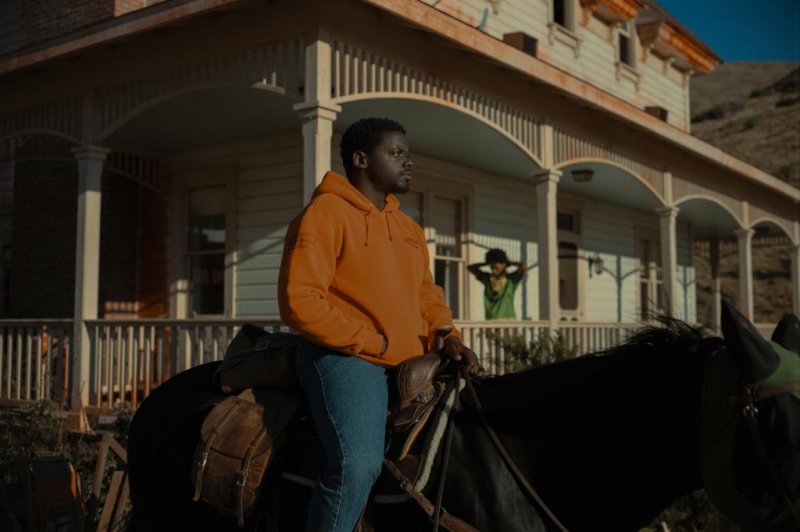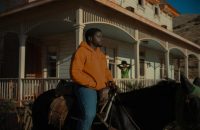
Jordan Peele’s latest horror venture, Nope, opens on a deeply unsettling act of violence: a chimp wearing a party hat lounges next to a couch on an abandoned film set. His face and hands are soaked in blood, and in the wreckage surrounding him is a semi-visible body, whose feet twitch weakly.
So begins one of the strangest and most sublime movies of the past decade. As it happens, I spent a couple of days last fall fixated on real-life cases of chimp attacks, which are uncommon, but devastating. There’s something deeply compelling about the dynamic surrounding a chimp attack, which tend to happen when people treat this immensely strong and, in the wild, warlike animal as though it’s a strange but endearing semi-human. Chimps are familiar. They look like us. Most people think of them in terms of their genetic and social similarities to humans and by extension we tend to define them by their inability to measure up to our intellect. When a chimp casually shreds a human, it feels like more than a tragedy. It feels like a betrayal of the natural order of things.
If you’ve seen the trailers for this movie, you think you know what Nope is about. You are mistaken. Which is odd, because the synopsis offered by the trailers isn’t a lie: Nope is about a pair of siblings who try to capture footage of a local UFO in a last-ditch effort to save their struggling stunthorse ranch on the edge of Hollywood.
It’s difficult to talk about this movie without saying too much. Nope relies on what the audience assumes they know as much as it does on traditional storytelling, which means that you’ll be most affected by it the less you know. It’s a rare movie that invites you to discuss its themes more than its plot, and I simply don’t know how to write about it otherwise, so here goes:
I have seen other reviews for this movie call Nope sci-fi, or otherwise regard it as a deviation from the other films in Jordan Peele’s trilogy. Respectfully, that is absolutely coconuts. Nope is a horror movie. It is nightmarish. It’s just that its assault on your mind is existential—a merciless interrogation of what you think you know about the world and your place in it.
It’s relevant that Nope takes place on the fringes of the LA film industry, a town of domesticated people. If everybody in LA was a dog, they would all be Pomeranians. They would not make it in the wild, and yet are so utterly confident in their complete control over the world. There’s no tragedy in Hollywood you can’t commodify, no issue that you can’t talk, run, or buy your way out of. It’s an artform and a business that relies on emotional distance: when you film something you make it knowable, subject to scrutiny and study. Nothing could be farther from our animal nature, and in that way the work of filmmaking is an act of self-soothing. In our current age of ecological and political uncertainty and dread, the question of whether to face our own existential realities or continue to sit comfy in our position of cool, dismissive cowardice becomes more urgent every day. Eventually, the decision will be made for us.
The real tragedy of the human experience is that all the great things we’ve made and done rely on sustaining this delusion of control—a “dream we can never wake up from,” to paraphrase the film. We chase UFOs for the same reason we build monuments to ourselves and construct unsustainable industries and put party hats on chimps: we’re trying desperately to touch eternity.
“What’s a bad miracle?” Daniel Kaluuya asks, in an elegant and characteristically stony-faced performance. “Do we have a word for that?” We do, in fact, have a term for a bad miracle, but its clumsiness reveals how poorly equipped we are to deal with unpredictable calamity: the term is “freak accident.” Where miracles make us feel divinely protected, freak accidents remind us that we are mostly meat and water held together with wishes and a little electricity, ruinously vulnerable to every horrible thing that happens in nature, all the things we think ourselves above and which we routinely subject the non-human world to. We convince ourselves we own this place. That even the things we don’t understand are things we understand. You think you know what a UFO is—that it is a spaceship full of creatures that might be strange, but mostly look like you and have a society like yours and think very much like you. It’s our failure of imagination that will eventually kill us.
10/10 Nope is a perfect movie.




